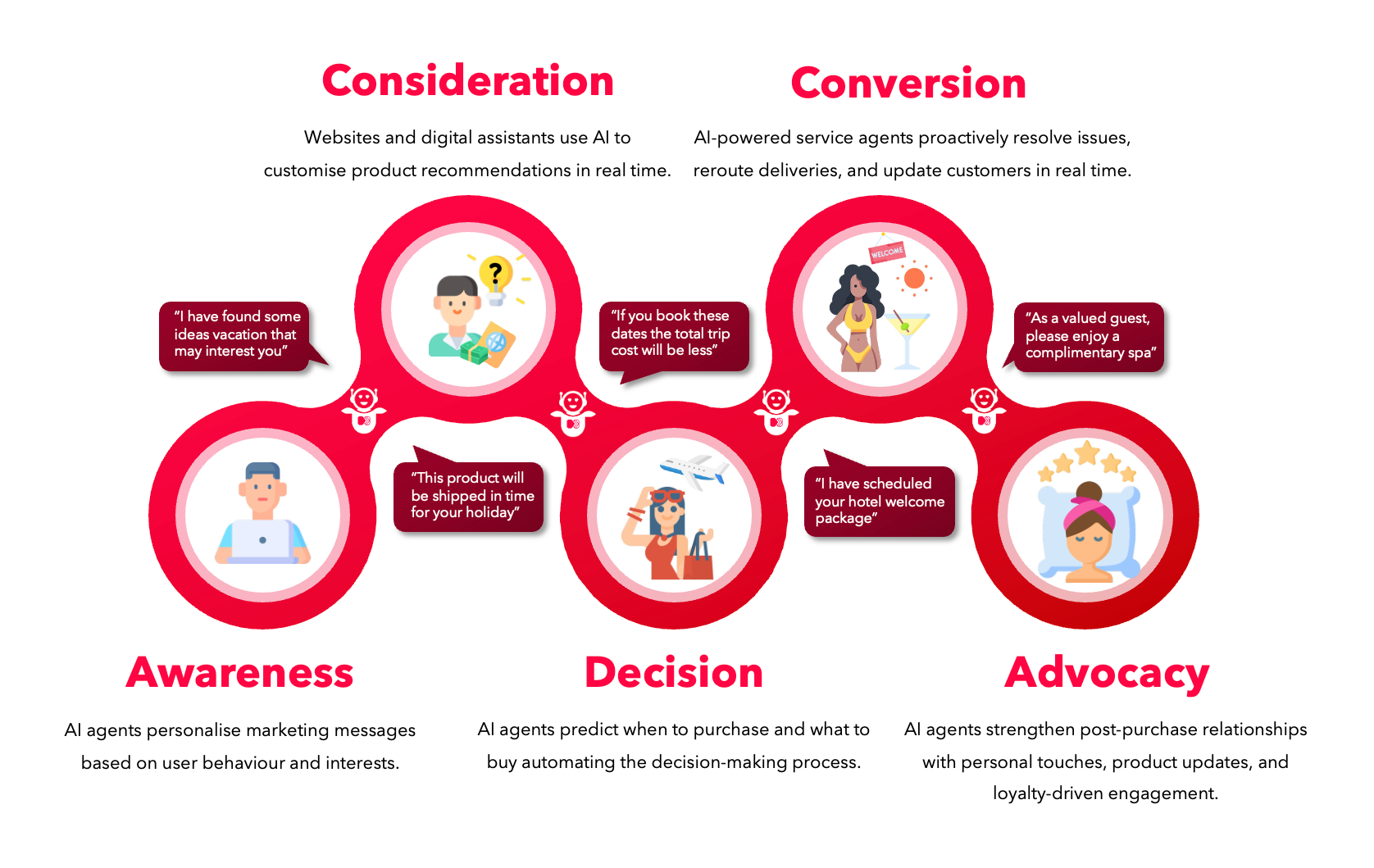It’s here. It’s inevitable. It’s part of everyday life for most – and no doubt all over news and your professional feed if you’re reading this. But let’s cut through some of the noise for a moment, and understand how AI is rapidly evolving and innovating customer experiences in travel and hospitality landscape. In today’s world, price wars and location perks are no longer enough to secure customer loyalty. Experience is the new currency. With 73% of travellers stating that customer experience is the single most important factor when booking a trip, the stakes have never been higher. And increasingly, the edge lies not just in human service, but in the seamless integration of Artificial Intelligence (AI) agents that redefine convenience, personalisation, and responsiveness.
The travel and hospitality sector has witnessed a dramatic shift since the pandemic. With the acceleration of digital transformation, both travellers and providers are adapting to a world where AI is not only useful — it’s indispensable. In a £10 Trillion global industry, intelligent automation is fast becoming the standard, not the exception. So, the real question for travel and hospitality businesses is simple: should you embrace AI, or stick or traditional services and risk extinction?
From concierge to code: AI’s role in service
The old-world charm of five-star concierges, personal tour guides, and bespoke trip planning hasn’t disappeared! It’s just been digitised, ‘phygitised’ (seamless connection between physical and digital touch points) and scaled.
Today’s AI agents function as virtual travel assistants, customer service reps, itinerary planners, and loyalty programme managers. They provide 24/7 availability, instantaneous responses, and an ever-expanding database of user preferences.
Take KLM Royal Dutch Airlines, which deploys AI-powered bots on WhatsApp, Facebook Messenger and Twitter to handle bookings, provide flight updates, and answer FAQs in real time. Or Hilton Hotels, which uses AI to monitor guest preferences and deliver personalised room experiences — lighting, temperature, even pillow type — without a single call to the front desk. The results? Faster responses, lower operational costs, and soaring satisfaction rates.

Customise another day: AI’s licence to personalise
One of the long-standing criticisms of digital transformation is the loss of human warmth and spontaneity. But AI, when deployed strategically, doesn’t diminish human interaction — it enhances it.
In travel and hospitality, personalisation isn’t a luxury anymore. It’s the standard expectation. A survey by Salesforce found that 84% of customers want to be treated like a person, not a number. AI excels here by using data, past purchases, travel history, social media footprints, even sentiment analysis from reviews, to create hyper-personalised experiences.
Imagine a returning guest arriving at a hotel where the check-in system already knows their preferred room temperature, dining preferences, and spa appointment history. AI makes this not only possible, but automatic. This creates continuity across visits and builds an emotional connection far beyond transactional interactions.
Case in point: Marriott’s AI-powered chatbot helps guests request services, amenities, or local recommendations — without waiting in queues or navigating complex menus. The result? Higher NPS scores, better reviews, and increased direct bookings.
No time to queue: AI powers frictionless travel
Travel is full of friction — flight delays, booking errors, lost luggage, language barriers. And AI agents can offer real-time solutions that anticipate, resolve, and even prevent issues before they occur.
Start at the inspiration and search stage. AI travel platforms like Skyscanner and Expedia use machine learning to suggest optimal times to fly, predict price changes, and personalise deals based on user behaviour. At the booking stage, AI handles multiple bookings across platforms, applies loyalty rewards, and integrates with digital wallets.
During the journey, AI comes into its own. For example, Singapore’s Changi Airport uses predictive analytics and AI bots to manage passenger flow, reducing bottlenecks and wait times. Facial recognition technology streamlines boarding processes, while AI monitors baggage routing to minimise lost luggage incidents.
For hospitality providers, AI also plays a key role in revenue optimisation. Dynamic pricing algorithms, informed by real-time demand, weather patterns, local events, and even competitor data, help hotels and airlines maximise revenue without alienating customers.
You only translate once: breaking barriers with AI
The hospitality industry is, by nature, global. Travellers often interact with service providers across linguistic and cultural lines, making clear communication a significant challenge.
Enter AI-driven language models. Real-time translation tools embedded in mobile apps or chatbots break down barriers instantly. Companies like Airbnb use machine learning translation engines that automatically convert listings and messages between host and guest languages, enhancing understanding and reducing friction.
Furthermore, AI can be programmed to reflect cultural sensitivities — offering polite and localised responses in accordance with guest expectations. This builds trust and comfort, especially for travellers who may be navigating a foreign environment for the first time!
For your needs only: the era of predictive hospitality
Reactive service is no longer sufficient. Predictive hospitality, anticipating needs before they’re voiced is now the gold standard. Thanks to AI, hotels and travel agencies are increasingly able to read data signals and deliver what the customer wants before the customer even asks.
Examples can include:
Suggesting room upgrades during check-in based on past preferences and loyalty status.
Notifying guests about spa availability after a long international flight.
Recommending restaurants that fit dietary restrictions already noted in previous bookings.
This is not secret service intelligence – it’s your experience and your data! Companies like Four Seasons and Accor are leveraging AI agents integrated with CRM systems to achieve predictive excellence, and it’s paying off. Studies show predictive personalisation can increase upsell success by 20–30% and drive higher guest satisfaction.
AI’s ethical tightrope in Travel
But all is not smooth sailing. With great data comes great responsibility. AI systems are only as good as the data they are trained on, and bias or errors can lead to customer dissatisfaction (or worse...).
Data privacy is a major concern. The travel sector deals with sensitive customer information, from passport numbers to payment details. Companies must be transparent about data usage and invest in robust cybersecurity measures. The EU’s GDPR regulations, and similar global frameworks, necessitate strict compliance, especially for AI systems that learn from customer behaviour.
There’s also the danger of over-automation. When AI is used as a cost-cutting measure at the expense of human connection, it backfires! Guests may appreciate speed, but not at the cost of empathy! The key is to find balance, augmenting and complimenting human service with AI rather than replacing it.
How AI maturity defines the front-runners
The gap between digitally mature and laggard organisations in travel and hospitality is growing rapidly. A recent Accenture study found that AI-mature travel companies report 2.5x higher revenue growth and 3x more customer engagement than their less AI-savvy counterparts.
AI maturity is not just about technology — it’s about mindset, culture, and leadership. It’s about investing in the right systems, training staff to work alongside machines, and constantly iterating based on customer feedback. The winners in this new era will be those who embed AI not as a tool, but as a strategic core of their customer experience vision.
Tomorrow Never Types: AI Enters the Chat
As natural language processing (NLP) evolves, AI agents are becoming less robotic and more conversational. We’re entering an era where speaking to a virtual agent is indistinguishable from talking to a human.
In the near future, AI travel agents will handle end-to-end trip planning through voice or text-based conversations. “Book me a beach holiday for under £1,500 next month with yoga retreats” will yield curated results, bookings, and recommendations within seconds.
Voice assistants and visualisers like Siri, Amazon Alexa and Google Assistant, Apple Vision Pro etc. are already being integrated into hotel rooms to control lighting, temperature, and entertainment, all via voice. The line between human support and technology is blurring, and this should not be seen as a dystopia; but opportunity and convenience.
AI as the new first-class experience
The message for travel and hospitality providers is clear: AI is no longer optional. It is the new first-class experience — an experience enhancer, a revenue driver, and a competitive differentiator. Those who adopt it with care, creativity, and customer empathy will thrive. Those who lag behind, hoping tradition will hold indefinitely, will find themselves irrelevant in an industry that rewards innovation.
In a world where customer expectations travel faster than planes, only those who combine intelligence with experience will earn lasting loyalty. AI isn’t just upgrading the customer journey — it’s rewriting the entire itinerary. The question for the sector isn’t whether to take on this mission. It’s whether you can afford not to!

